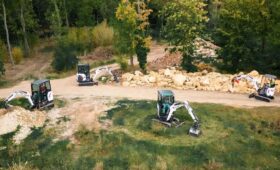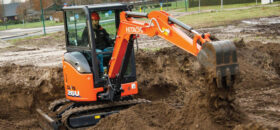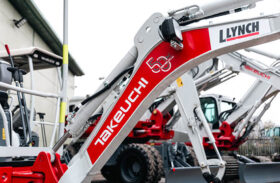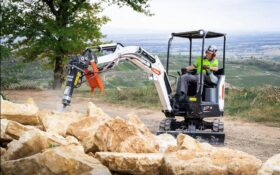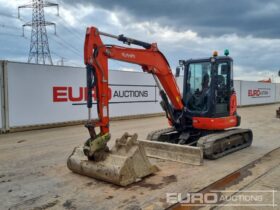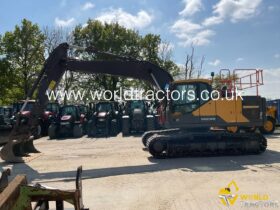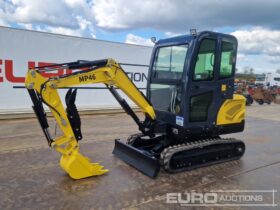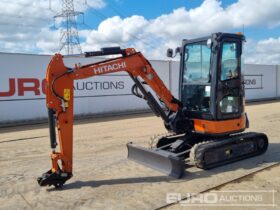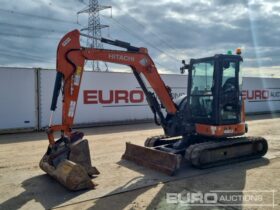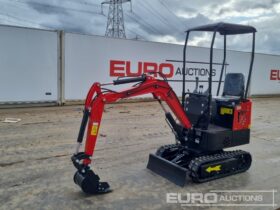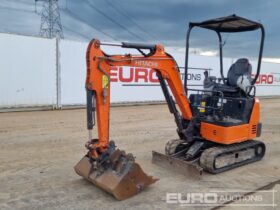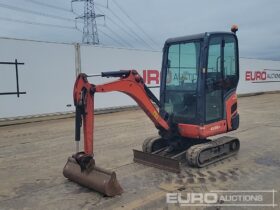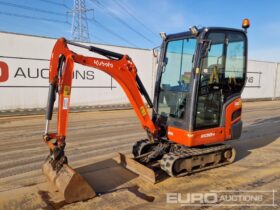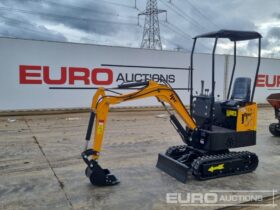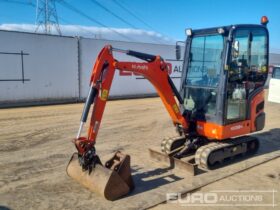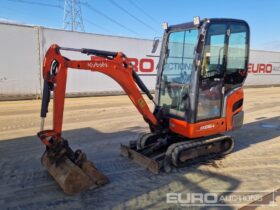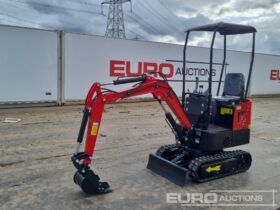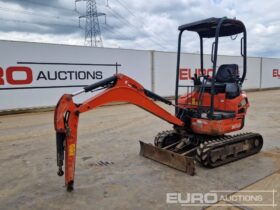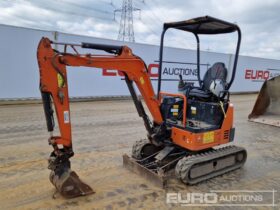Mini Excavators for Sale (725)
Buying a mini digger isn’t an exact science – there is no general agreement on what makes a mini-digger. It’s clear that a 0.8 ton machine is a mini excavator, but as we go up the weight range, some manufacturers and operators start to use the term midi-diggers. Let’s not even start on micro-diggers. We all know what they are for – smaller excavation works, domestic house building and renovation, landscaping projects – the list is endless. The question is when does a mini digger grow up to become a ‘proper’ excavator. JCB claim that their 10-tonne compact excavator machines fall into the category of mini-excavators, but most other manufacturers draw the line at around 5.5 tonnes, like Komatsu whilst Kubota stretch to 8 tonnes. A mini-digger will hold value extremely well in the second hand market if looked after. Look for a machine that has been well serviced and not had to work too hard for its living in first life.
More Mini Excavators Info
Market Size
The mini digger sector is one of the most competitive areas of the world market for construction machinery estimates of its value are in the $6 billion annually. Buyers can choose from more than 20 major manufacturers with more coming to the market. There are approximately 200,000 sold worldwide each year which makes it the largest sector of the annual 700,000-unit construction equipment market.
Why Buy a Mini Excavator?
Typically a mini excavator will operate on tracks – they are essentially mini-crawler excavators. This makes them more stable when digging, compared to a backhoe loader, for example.
The digging efficiency is greater than for a wheeled machine because there is no need to deploy the stabilisers prior to starting to dig.
Mini diggers are not just about digging. They are available with a host of alternative attachments that means that they can apply themselves to a wide range of tasks – hydraulic breakers is one such example of a useful attachment.
What’s a Zero Swing Mini Excavator?
A tail swing excavator is the traditional, more commonplace excavator where the rear of the machine protrudes from the width of the tracks when operating sideways on. When working at the roadside or in tight spaces, this gives the operator something extra to think about and could lead to potential accidents.
A zero swing mini digger avoids the rear of the cab and counterweight swinging beyond the extremities of the outer tracks.
Model numbers often give away whether a digger is a zero swing (will have a ‘Z’ in it like the JCB 8025 ZTS) whereas you may find a ‘C’ for conventional excavator.
Will the Mini Digger Fit?
There are often jobs that have limited access – in fact there may only be access through a back gate or even a front door. Consider jobs in urban environments where a terraced house may have a huge excavation requirement in the back garden, but has no access other than through the house!
In these cases the width of the mini digger is crucial. Take Caterpillar’s smallest machine, the 300.9D for example. The overall width is just 730mm which means it should fit comfortably through most front doors in the UK. Looking at JCB’s smallest mini excavator the 8008, this conventional tailswing micro excavator it is even narrower at just 700mm with the tracks retracted. When the digging area is reached, these tracks can be widened for increased stability to 865mm. With a digging depth of 1.7 metres, this machine can get the job done ten times faster than manual digging alone – worth every penny to avoid the back-breaking manual digging jobs!
These tiny mini diggers are often called micro excavators or micro diggers, but they can definitely save huge amounts of time on excavator work in confined spaces or with restricted access.
I am Working Inside – Will an Electric Mini Excavator fit?
The electric range from JCB and Caterpillar starts at larger models that are up to 1 metre wide. However, electric micro excavators are available, including the Bobcat E10e which has a retracted width of just 710mm and extends to a 1100mm width for silent and emission free operation. Using electric mini diggers for these types of jobs in restricted areas makes perfect sense as it makes it a much better environment to work in plus there is no need to spend additional money on extraction systems.
There are also hybrid excavators that have a diesel engine that can drive and power the machine, but it can also be powered by an external source feeding the machine electricity from outside. Examples of these types of machines are the Takeuchi TB216 Hybrid excavator and the Caterpillar 300.9D VPS (Versatile Power System).
More about Electric Mini Excavators
It makes perfect sense do operate an electric mini excavator where possible. Zero emissions on-site is the number one advantage for the environment – especially when working in confined spaces. However, there are plenty of other reasons to opt for an electric model. The machines operate almost silently, which can really help out on an internal job – especially where there are multiple machines in operation. Consider the refuelling as well. No need for fuel bowsers or messy fuel cans on site – as long as there is a power source, these machines can be charged overnight. Take the JCB 19C-IE electric mini digger, it can be recharged using 110, 230 and 415 volts inputs and can work for a full five hours before requiring a recharge. Using a 3-phase 415V charger the machine can be fully recharged from empty in just 2.5 hours – a normal power supply can reach 80% in five hours and at 110V you will have to leave it overnight for ten hours to get to 80%.
Volvo CE also make a couple of models of electric mini digger, the ECR18 Electric and the larger ECR25 that at the moment (March 2023) are available to reserve, whereas JCB and Bobcat have plenty electric mini diggers in operation. The Volvos are the widest of the popular electric models available at present at 1352mm against the tiny Bobcat’s 710 and the JCB’s 980. All three of these are conventional tailswing versions. If you are looking for a zero tailswing electric mini digger then you should turn to the Wacker Neuson EZ17E. This machine excels with the highest travel speed of its immediate competitors (4.5kph) plus largest arm tearout (9.1kN) and bucket breakout (20.5kN).
Volvo also manufacture the larger ECR25 with an operating weight from 2680 to 2780kg. This machine can run for up to four hours before recharging and takes just 50 minutes to get back to 80% again. With digging depth of down to nearly three metres, this machine is a proper excavator.
There are more models due to hit the market soon, including Takeuchi’s TB20e. the manufacturer claims that this machine will be able to operate continuously for up to eight hours. The operator has the opportunity to tether the machine to a power supply and keep working. Using the three-phase power, the machine is back to a full charge in a maximum of four hours.
Latest News About Mini Excavators
New Generation of Bobcat 1-2 t Mini Excavators
Bobcat has revealed the company’s new groundbreaking R2-Series 1-2 tonne mini excavator models for the first time. The new generation R2-Series 1-2 tonne mini excavators include the E16, E17z, E19 and E20z models, replacing the previous M-Series E17, E17z, E19 and E20z machines, respectively. The M-Series, originally introduced in 2014, has now been succeeded by...
Electric Volvo Mini Diggers on London Mobile Charging Trial
A challenge for many urban sites operating electric construction equipment is access to charging power. To solve this, Volvo CE initiated collaboration with a UK start-up on a solution. Now the two companies are playing a pivotal role in the UK-first introduction of an innovative ‘on-demand’ mobile charging van to power several electric worksites in...
Hitachi and KTEG Mini and Compact Excavators at Bauma
Eight new mini and compact excavators will appear on the Hitachi stand at Bauma 2025. Seven of these models, ranging from one to six tonnes, are a result of the KTEG joint venture between Hitachi Construction Machinery Co., Ltd. (HCM) and Kiesel Technologie Entwicklung GmbH. The nine-tonne compact ZX95US-7 excavator is manufactured by HCM. Highly...
Takeuchi Sells 50,000th Excavator in the UK
Takeuchi has recently hit the 50,000th sales milestone in the UK and Ireland. The 50,000th Takeuchi, a TB217R mini excavator was sold by Takeuchi dealer in the south CBL to L-Lynch Plant Hire & Haulage as part of a recent order for over 100 machines, including the latest 3rd generation 3-Series excavators. It’s not Lynch’s...
New Bobcat 1-2t Mini Excavators at Bauma 2025
Bauma 2025 will host the world premiere of Bobcat’s new 1-2 t mini excavators and the latest upgrade of the E88 mini excavator, the top-of-the-range model in Europe. Bobcat will also demonstrate how it is bringing its new technologies to the jobsite of the future. From the RogueX and RogueX2 autonomous loader concepts, the TL25.60e...

